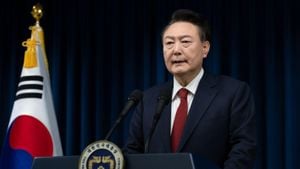Law enforcement agencies are bracing themselves after the recent, shocking murder of UnitedHealthcare CEO Brian Thompson, which has sparked widespread concern about potential threats to healthcare executives. The incident, occurring just outside a hotel in Manhattan, has sent ripples of fear through the healthcare industry, as well as ignited public discourse surrounding the often controversial practices of health insurance companies.
On December 4, Brian Thompson, who had been leading UnitedHealthcare's insurance arm since April 2021, was shot dead. The killing was characterized by the New York Police Department as targeted. Following the brazen attack, authorities issued bulletins warning of rising threats against not just Thompson but other executives within the healthcare sector as well. According to a Colorado law enforcement bulletin obtained by ABC News, calls “for targeting the executive team, their families, homes, and places of work have become widespread.”
Social media responses to Thompson's murder have been particularly disturbing. Within hours of the killing, some spoke up with morbid praise for the act, expressing views on platforms like X (the rebranded Twitter) which framed the shooting as justified, reflecting the anger many feel toward the exorbitant costs and practices of the health insurance industry. This sentiment has created nervousness among law enforcement, who noted the potential use of Thompson's murder as propaganda training for potential future aggressors.
The suspected gunman, 26-year-old Luigi Mangione, was arrested after police identified him using surveillance footage. Before his arrest, he managed to evade capture for several days, resulting in significant media coverage and public interest. Mangione's arrest was not only for murder charges; he was also taken down for possession of unregistered firearms, which included what is referred to as ghost guns — easily assembled firearms with no serial numbers.
Witnesses described Mangione as having displayed erratic behavior during his court appearance, raising eyebrows as he angrily shouted anti-establishment sentiments. His lawyer has indicated he will fight extradition to New York, where the murder charges await him. Meanwhile, officials have also uncovered the existence of a handwritten manifesto belonging to Mangione. This document reportedly outlines criticisms of the healthcare system, branding its executives as ‘parasites’ aligned against patients' interests.
Interestingly, sympathetic responses to Mangione have emerged online with some people expressing feelings of empathy for the frustrations he voiced. Since his arrest, hashtags such as #FreeLuigi have emerged, leading to debates about personal grievances and societal rage against the healthcare system. Many seem to view his violent act as symptomatic of broader systemic issues plaguing the industry. An alarming number of Americans share similar frustrations over the soaring costs of healthcare which are, incidentally, pushing individuals toward financial ruin.
Discussions around the mental and physical struggles faced by Mangione also paint a tragic portrait of his life leading up to the incident. Friends revealed he had dealt with chronic back pain which led to significant disruptions in his life, including extended periods away from work. Feelings of isolation and pain appear to have compounded his grievances against the very system he sought to confront.
Senator Elizabeth Warren has also weighed in on the incident, attempting to clarify her previous remarks on the killing, indicating, "Violence is never the answer. Period." Her assertion reflects the growing concerns surrounding not just Mangione's actions but the larger societal issues embedded within the American healthcare framework. Amid this discourse, some are very concerned about rising tensions and how public sentiment may lead to more violent outcomes.
Thompson’s murder, as heinous as it was, opens doors to discussions about healthcare, affordability, and the struggles faced by many Americans who feel marginalized by social systems orchestrated for profit rather than care. This event has amplified voices calling for reform, making it clear just how much pressure is building within society over healthcare inadequacies.
Now, with Mangione scheduled for legal proceedings, questions loom not only over his future but also the responsibility of institutions to provide adequate healthcare solutions. The incident symbolizes more than just one tragic end — it highlights the crumbling faith many have toward the healthcare industry and raises difficult questions about violence and activism.



